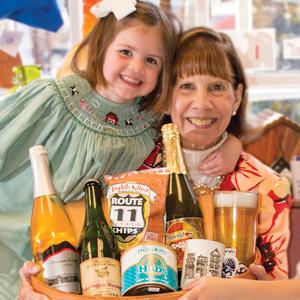Born in St. Louis, Sally Bagley considers herself very much a Virginian. Like many of us, the Richmond City resident and grandmother of five has grown to cherish Virginia for its geography, among other things.
“Virginia is just so unique in that you can leave Richmond and travel for two hours in one direction and hit the mountains or travel in the other and hit the ocean. It’s just fabulous.”
Connected to that geographical diversity is a wide selection of products that originate here in Virginia.
“I am so proud of this state,” said Bagley, who moved here in 1970. “We have so many wonderful things here, and I’m afraid some people don’t know that. I want to do my part to share it.”
Bagley is forever dedicated to purchasing products made in Virginia for herself, her family, and her friends. With the holiday season upon us, she’s busy putting the finishing touches on her shopping list.
“Gift baskets are always a great idea,” she said. “I fill them with Virginia products. I love supporting the state – plus, we have the best stuff!”
From premium country ham to the finest, award-winning wines, Virginia is home to a wide variety of products that are bound to satisfy even the most discerning tastes. Planning a holiday party? You can easily fill your table with foods from Virginia. There’s a lot more to Virginia cuisine than those peanuts in the crystal bowl you’ve positioned next to the mints, and your guests will no doubt be surprised to learn just how many delectable delights come from the Commonwealth.
With its diverse geography stretching from the Chesapeake Bay to the Shenandoah Valley, Virginia is home to more than 47,000 farms. Not surprisingly, then, agriculture is the state’s largest industry. But Virginia touts so much more. Let’s take a look at some of Virginia’s finest products by region.
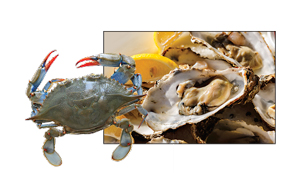
Coastal Virginia and the Chesapeake Bay
Although many associate the blue crab with Maryland, Virginia is the nation’s third largest seafood producer. Tangier Island on the Eastern Shore of Virginia, is often referred to as the “soft shell crab capital of the world.” And while it may surprise many to think of Virginia as a top oyster producer, it shouldn’t. The state recently marked its largest oyster harvest in more than twenty-five years.
“The oyster population declined in the 1960s, but we are now back with a vengeance,” said Ryan Croxton, who owns the Rappahannock Oyster Company with his cousin, Travis. “There is no better place to grow oysters than the Chesapeake region, but I constantly hear, ‘I didn’t know Virginia produced oysters.’ I want people to not just be aware of that fact, but be proud of it.”
Oysters have a rich history in our state, with most historians in agreement that the Pilgrims celebrated the first Thanksgiving in 1621 by feasting on, not just turkey, but lots of oysters. Today’s celebration of the oyster is not confined to the Thanksgiving holiday, that’s for sure, with popular regional festivals like the one last month in Chincoteague and this month in Urbanna. But odds are good, the Pilgrims would not have approved of the libations served at these local rites of fall. (More on those later!)
The diverse flavor of Virginia oysters – from the saltiest on the Eastern Shore to the sweeter taste of Rappahannock River oysters – gives residents and visitors alike a lot to love about this tasty treat.
“Oysters take on the flavor of their region,” said Croxton, who grew up in Tappahannock. “Literally, it is a taste of home.”
Croxton’s great grandfather started Rappahannock Oyster, located in Topping, in 1899. Ryan plans to continue family tradition for years to come. “It’s a part of Virginia history, part of our heritage, and I’m proud to carry that on,” he said.
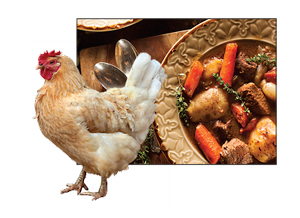
Central and Southern Virginia
When you think comfort food, do you think stew? Look no further than Brunswick County for some of the most hearty and satisfying. Brunswick stew is a staple in many pantries across the state and is served at most cool-weather festivals in the region, like the one this month at the 17th Street Farmer’s Market.
The South is also famous for its
classic fried chicken and black-eyed peas. At historic Michie Tavern, located near Charlottesville, the menu features these items, along with cornbread, biscuits,
and slaw.
“We were raised on that,” said Wendy Osborn, a regular customer at The Made in Virginia Store. “That’s how I grew up. I think because of that, it has become a way of life for my family and me. That tradition is something that needs to be preserved.”
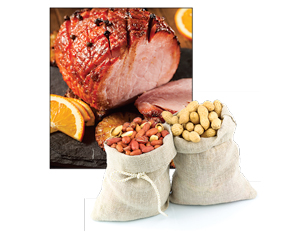
Hampton Roads
This region is also known for quality seafood, but its ham and peanuts really put it on the map. Most famous are the Smithfield hams, which, by law, must be cured within Smithfield’s town limits to earn the right to display that label.
The early settlers learned from the Indians how to smoke meats, and since that time Virginia’s reputation for producing the best hams has exploded. Walk into any Virginia gift shop, and you are bound to find a ham or two for sale.
“Sliced ham is our most popular,” said Darryl Flick, owner of the O’Virginia store in Carytown. “We sell a lot to people who are traveling, and others love to give them as part of a gift basket.”
More often than not, Flick said, peanuts are included in the gift assortment. Who, after all, hasn’t heard about the Virginia peanut? Virginia peanuts are the largest of the four peanut types grown in the United States. High in protein, despite the allergy issues many families struggle with, peanuts are still a healthy snack for the majority of us. One of Flick’s customers stops by regularly to stock up on peanut packs for her children.
“People want to buy products made in their home state,” Flick said. “The flavors and aromas remind them of their childhoods. It’s all about family traditions.”
Peanuts have been around for about 3,500 years and are thought to have originated on the slopes of the Andes in Brazil and in Peru. Portuguese traders, explorers and missionaries transported peanuts to Africa and Spain. From there, they traveled by ship to The New World and were planted throughout the South. Peanuts were an excellent food source aboard ships because they were inexpensive and nutritious. Virginia’s first commercial crop was grown in Sussex County in the 1840s.
Today, peanuts are sold roasted in the shell, salted, unsalted, and seasoned with Old Bay, smoked Cajun, chili lime, mesquite barbecue, and more.
“There isn’t a day that goes by that we don’t sell some peanuts,” said Kathryne Mitchell, who owns The Made in Virginia Store in Fredericksburg with her husband, John. “Hams are also right up there. And they seem to always be included in gift baskets this time of year. It just wouldn’t be Christmas without them.”
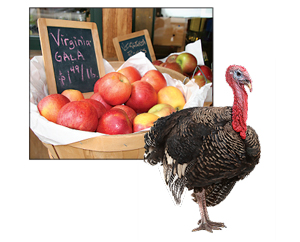
Shenandoah Valley
The fertile valley makes this area perfect for apples and peaches. Poultry is also raised in abundance here, with broiler chickens being the second largest agricultural product for the state.
Rockingham County, in particular, is proud of its rich agricultural heritage. The county shines during the Thanksgiving season because it leads Virginia in poultry production. Two turkey statues – one at either end of Route 11 – speak to the county’s pride in this fact and gently remind visitors that the county is also known as the “turkey capital of the world.”
Virginia also ranks as one of the nation’s top six producers of apples. Red and Golden Delicious, Rome, Stayman, York, Winesap, Granny Smith, Jonathan, and Gala are just some of the varieties found in hillside groves. Winchester, the state’s top apple-packaging location at the northern tip of the Shenandoah Valley, is sometimes called – you guessed it – “the apple capital of the world.”
During the cool, crisp days of autumn, visitors swarm to pick-your-own orchards for apples. When warmer weather arrives, they return for sweet peaches, nectarines, and other crops.
“I love trying out all types of Virginia products,” said Bagley, who served as the 2010 Richmond Christmas Mother, which provides needy children and families with toys, clothing, food, and other assistance during the holidays. “My favorite has to be Virginia peanuts, but I love Virginia salsa too. I’m proud to support the state I love.”
Virginia merchants could not agree more.
“I love selling Virginia products,” Flick said. “What I do is part of the bigger picture. These people who grow and produce Virginia products…are keeping family traditions and family values alive. They are taking ownership in the state. They are part of what makes Virginia great.”
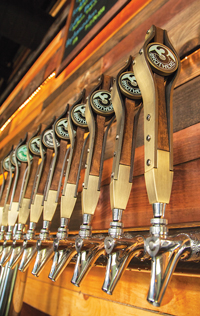 Craft Beer Popularity is Overflowing
Craft Beer Popularity is Overflowing
Bill Bien has always been one to enjoy a nice cold beer on a hot summer day. You know, the kind Virginia is famous for? But it wasn’t until craft beer hit the Richmond scene that he really began to savor the taste.
“Craft beer is more flavorful,” he said. “There are so many different types, from specialty beers available during the holidays to fruit-infused beers. Virginia might be a little late in developing it, but we are coming on strong.”
Legend Brewery Company in downtown Richmond is Virginia’s oldest microbrewery. Since it opened in 1994, though, the state’s craft beer industry has exploded. Today, Virginia is home to more than eighty breweries, with more opening every year. Richmond is home to about a dozen.
“I like to support the local folks,” said Bien, who lives near the University of Richmond. “Plus, we have some pretty good beer right here in our own back yard.”
People are taking notice. To celebrate the growing industry, August was designated Virginia Craft Beer Month in Virginia by the Virginia Tourism Corporation. And the Travel Channel recently named Virginia as one of the nation’s top seven beer destinations.
“With eighty-four breweries and counting, Virginia is making its mark on the craft beer scene,” said Rita McClenny, president and CEO of the Virginia Tourism Corporation. “Virginia is fast becoming the prime East Coast destination for travelers looking for local flavor… with breweries in every corner of the state.”
You can find Virginia’s craft breweries in the relaxing countryside of Lexington as well as faster-paced Alexandria. Rural Goochland County got in on the action last year when Sean Pumphrey opened Lickinghole Creek Craft Brewery with his wife, Lisa, and friend, Farris Loutfi. The 220-acre farm grows hops, barley, herbs, and spices for use in the brewery’s Estate Series of beers.
“What’s great about Virginia breweries is we each have our own distinctive portfolios,” Pumphrey said. “Each of us is providing a unique experience for our customers.”
Thanks to the passage of Senate Bill 604 in 2012, breweries licensed in the state can now sell their beer for on-premises consumption. That has translated into big business in Virginia, with craft beer making an estimated economic impact of more than $622 million. A study by the Brewers Association found that the craft beer industry employs more than 8,000 people, with an average wage of $33,541 and total labor income of more than $273 million.
“When you go to a brewery, there’s a real sense of community,” said David Hunter, founder of Fans of Virginia Craft Breweries. “You are meeting fellow Virginians who really have a passion for what they do. At the same time, you are supporting local industry.”
Since Hunter founded the group in March 2013, membership has tripled and now stands at about four thousand strong. Many members, including Hunter, enjoy giving unique brews as Christmas gifts. Gingerbread Stout, for example, is a big seller for Hardywood Park Craft Brewery in Richmond.
“It’s not just about the beer,” Bien said. “It’s a social thing. It’s about getting together with friends and meeting new ones. It’s so nice to see this really taking off in Virginia.”
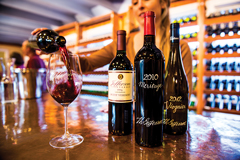 Yes, Virginia is for Wine Lovers
Yes, Virginia is for Wine Lovers
Yes, craft beer is all the rage, but first came wine, and Virginia is home to more than two hundred wineries, with locations in nearly every region of the state. Pretty impressive numbers, when you consider the Commonwealth had just six wineries in 1980.
“I never realized Virginia was a wine state,” said Martha Embrey, a regular customer at The Made in Virginia Store in Fredericksburg. “But then a few years ago, a friend of mine began growing grapes. More and more wineries began opening. My eyes were
really opened too.”
Embrey typically purchases hams, peanuts, and other Virginia products to send in gift baskets to relatives and friends in Nebraska, Colorado, and Richmond. And while hams and peanuts may be the most popular Virginia items to give as gifts, Virginia wines are gaining ground as the state’s wine industry continues to grow in both the number of wineries and in prestige.
“A lot of people don’t realize that the Virginia wine industry is so healthy,” said Darryl Flick, owner of O’Virginia in Carytown. “But we rank fifth in the nation for wine production. I think most people’s minds are on California when they think wine, but we are really making a name for ourselves.”
Virginians have made wine for more than four centuries, but admittedly, weren’t very good at it. Even Thomas Jefferson tried his hand at it, but was a failure. But spurred by his love of fine wine and his cultivation at Monticello of classic vinifera varieties, a small wine industry arose in the state in the early nineteenth century. It suffered setbacks during the Civil War and Prohibition.
Wine production resumed in the mid-1970s and has soared since as winemakers continue to refine production techniques. Jefferson would be thrilled to know Virginia wines now regularly win awards at national and international wine competitions.
That recognition is paying off big time. According to a recent economic impact study, the Virginia wine industry employs 4,700 people and contributes almost $750 million to the Virginia economy each year.
“A lot of people will ask me before they buy, ‘Is this really made in Virginia?’” said Kathryne Mitchell, who also co-owns The Made in Virginia Store. “I’m proud to tell them yes. Our wines come from Barboursville, Amissville, Williamsburg, and other Virginia locations. People are seeking out products made here and are willing to pay a little bit more for them because they want to support the community. That’s what makes living in Virginia and raising a family here so great.”
photos courtesy: Sarah Hauser, Judy Watkins, and Jefferson Vineyards for Virginia Tourism Corporation


